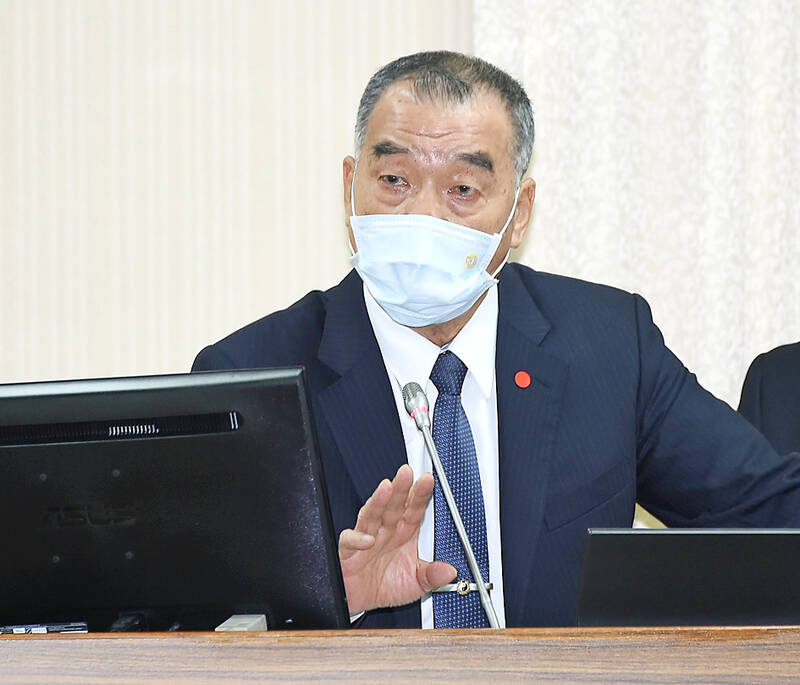The current military situation across the Taiwan Strait could take a turn for the worse if not handled cautiously, Minister of National Defense Chiu Kuo-cheng (邱國正) said yesterday, adding that the nation’s armed forces are always prepared and constantly sharpen their abilities.
At a meeting of the legislature’s Foreign and National Defense Committee, Chinese Nationalist Party (KMT) caucus whip William Tseng (曾銘宗) voiced concerns over the delay of several arms sales, which might affect the combat capabilities of the armed forces.
Chiu said that concern “is what the enemy hopes for,” as it allows them to make a move before Taiwan is prepared, but the armed forces “would not be sitting around waiting,” and would continue to train with existing weapons.

Photo: Tu Chien-jung, Taipei Times
The armed forces are always preparing for war and continuing to improve, Chiu said, adding that they could readily switch from a peacetime footing to a wartime one when the situation demands.
Chiu said that his ministry had agreed to raise the monthly salary for mandatory conscripts from NT$6,510 to NT$15,000 “if everyone thinks it’s acceptable.”
The military initially hoped the monthly salary could be increased to NT$25,000 based on the minimum wage, which is to be raised to NT$26,400 per month and NT$176 per hour next year, Chinese-language Credere Media reported on Wednesday last week, but the Executive Yuan had proposed raising a conscript’s monthly salary to NT$15,000 based on the minimum cost of living, which varied from NT$14,000 to NT$19,000 in different cities and counties.
Directorate-General of Budget, Accounting and Statistics Minister Chu Tzer-ming (朱澤民) on Thursday last week said that raising conscripts’ monthly salary to NT$15,000 was acceptable.
Separately yesterday at a meeting of the legislature’s Judiciary and Organic Laws and Statutes Committee, Tseng asked about the impact on Taiwan of Chinese President Xi Jinping (習近平) being granted a third term at the head of the Chinese Communist Party (CCP) Central Politburo Standing Committee.
National Security Bureau (NSB) Deputy Director-General Chen Chin-kuang (陳進廣) said that at the CCP’s 20th National Congress on Saturday the party included a clause in its constitution saying that it is “adamantly against Taiwan’s independence.”
Chen said that the newly appointed vice chairman and several members of the Central Military Commission have served in the Chinese People’s Liberation Army’s Eastern Theater Command or the Vietnam War.
When China’s economic growth begins to slow and its grip on society encounters challenges, the CCP might take action to shift the public’s attention from domestic affairs to foreign affairs, he said.
Asked by Tseng whether the NSB thought a war would break out in the Taiwan Strait within three years, Chen said: “Taiwan has to be prepared for every possible situation.”
When pressed for a response on the possibility of war within a year, Chen said: “We will not rule out the possibility” that Beijing, in a bid to divert some of its internal pressure, could use coercion as an approach, forcing Taiwan to reach a peace deal on the premise of unification.
Additional reporting by Aaron Tu

CARROT AND STICK: While unrelenting in its military threats, China attracted nearly 40,000 Taiwanese to over 400 business events last year Nearly 40,000 Taiwanese last year joined industry events in China, such as conferences and trade fairs, supported by the Chinese government, a study showed yesterday, as Beijing ramps up a charm offensive toward Taipei alongside military pressure. China has long taken a carrot-and-stick approach to Taiwan, threatening it with the prospect of military action while reaching out to those it believes are amenable to Beijing’s point of view. Taiwanese security officials are wary of what they see as Beijing’s influence campaigns to sway public opinion after Taipei and Beijing gradually resumed travel links halted by the COVID-19 pandemic, but the scale of

TRADE: A mandatory declaration of origin for manufactured goods bound for the US is to take effect on May 7 to block China from exploiting Taiwan’s trade channels All products manufactured in Taiwan and exported to the US must include a signed declaration of origin starting on May 7, the Bureau of Foreign Trade announced yesterday. US President Donald Trump on April 2 imposed a 32 percent tariff on imports from Taiwan, but one week later announced a 90-day pause on its implementation. However, a universal 10 percent tariff was immediately applied to most imports from around the world. On April 12, the Trump administration further exempted computers, smartphones and semiconductors from the new tariffs. In response, President William Lai’s (賴清德) administration has introduced a series of countermeasures to support affected

Pope Francis is be laid to rest on Saturday after lying in state for three days in St Peter’s Basilica, where the faithful are expected to flock to pay their respects to history’s first Latin American pontiff. The cardinals met yesterday in the Vatican’s synod hall to chart the next steps before a conclave begins to choose Francis’ successor, as condolences poured in from around the world. According to current norms, the conclave must begin between May 5 and 10. The cardinals set the funeral for Saturday at 10am in St Peter’s Square, to be celebrated by the dean of the College

CROSS-STRAIT: The vast majority of Taiwanese support maintaining the ‘status quo,’ while concern is rising about Beijing’s influence operations More than eight out of 10 Taiwanese reject Beijing’s “one country, two systems” framework for cross-strait relations, according to a survey released by the Mainland Affairs Council (MAC) on Thursday. The MAC’s latest quarterly survey found that 84.4 percent of respondents opposed Beijing’s “one country, two systems” formula for handling cross-strait relations — a figure consistent with past polling. Over the past three years, opposition to the framework has remained high, ranging from a low of 83.6 percent in April 2023 to a peak of 89.6 percent in April last year. In the most recent poll, 82.5 percent also rejected China’s